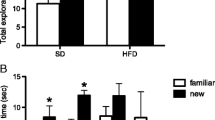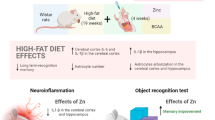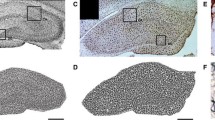Abstract
Obesity results from an energy imbalance and has been considered an epidemic due to its increasing rates worldwide. It is classified as a low-grade chronic inflammatory disease and has associated comorbidities. Different nutritional strategies are used for the purpose of weight loss, highlighting low-carbohydrate (LC) diets, ketogenic diets, and intermittent fasting (IF). These strategies can lead to metabolic and behavioral changes as they stimulate different biochemical pathways. Therefore, this study evaluated memory, energy metabolism, neuroinflammation, oxidative stress, and antioxidant defense parameters in mice subjected to an LC diet, ketogenic diet (KD), or IF. Eighty male Swiss mice, 60 days old, were divided into 4 groups: control, LC, KD, or IF. Body weight was measured weekly, and food intake every 48 h. After 15 days of nutritional interventions, the animals were subjected to the behavioral object recognition test and subsequently euthanized. Then, visceral fat was removed and weighed, and the brain was isolated for inflammatory and biochemical analysis. We concluded from this study that the LC and KD strategies could damage memory, IF improves the production of adenosine triphosphate (ATP), and the LC, KD, and IF strategies do not lead to neuroinflammatory damage but present damage at the level of oxidative stress.






Similar content being viewed by others
Data availability
All data generated or analyzed during this study is included in this published article (and its accompanying information files).
References
Ahn JH, Shin BN, Song M et al (2019) Intermittent fasting increases the expressions of SODs and catalase in granule and polymorphic cells and enhances neuroblast dendrite complexity and maturation in the adult gerbil dentate gyrus. Mol Med Rep 19:1721–1727. https://doi.org/10.3892/MMR.2019.9822
Bannister JV, Calabrese L (1987) Assays for superoxide dismutase. Methods Biochem Anal 32:279–312. https://doi.org/10.1002/9780470110539.CH5
Boulangé CL, Neves AL, Chilloux J et al (2016) Impact of the gut microbiota on inflammation, obesity, and metabolic Disease. Genome Med 8:1–12. https://doi.org/10.1186/s13073-016-0303-2
Bray GA, Kim KK, Wilding JPH (2017) Obesity: a chronic relapsing progressive disease process. A position statement of the World Obesity Federation. Obes Rev 18:715–723. https://doi.org/10.1111/obr.12551
Brownlow ML, Jung SH, Moore RJ et al (2017) Nutritional ketosis affects metabolism and behavior in Sprague-Dawley Rats in both control and chronic stress environments. Front Mol Neurosci 10:377. https://doi.org/10.3389/FNMOL.2017.00129
Cassina A, Radi R (1996) Differential inhibitory action of nitric oxide and peroxynitrite on mitochondrial electron transport. Arch Biochem Biophys 328:309–316. https://doi.org/10.1006/ABBI.1996.0178
Chausse B, Vieira-Lara MA, Sanchez AB et al (2015) Intermittent fasting results in tissue-specific changes in bioenergetics and redox state. PLoS ONE 10(3):e0120413. https://doi.org/10.1371/JOURNAL.PONE.0120413
Cheng Z, Tseng Y, White MF (2010) Insulin signaling meets mitochondria in metabolism. Trends Endocrinol Metab 21:589–598. https://doi.org/10.1016/j.tem.2010.06.005
Choi HR, Kim J, Lim H, Park YK (2018) Two-week exclusive supplementation of Modified Ketogenic Nutrition drink reserves lean body Mass and improves blood lipid Profile in obese adults: a Randomized Clinical Trial. Nutrients 10(12):1895. https://doi.org/10.3390/NU10121895
Churm R, Davies JS, Stephens JW, Prior SL (2017) Ghrelin function in human obesity and type 2 Diabetes: a concise review. Obes Rev 18:140–148. https://doi.org/10.1111/OBR.12474
CONCEA- Ministério da ciência, tecnologia e inovação conselho nacional de controle de experimentação animal (2016) Diretriz brasileira para o cuidado e a utilização de animais para fins científicos e didáticos – DBCA. IOP Publishing https://pages.cnpem.br/ceua/wp-content/uploads/sites/56/2015/06/DBCA. Accessed in 04 de junho de 2023
Dahlke AP, Viana KRF (2018) Revisão sistemática: dieta cetogênica e suas implicações na performance. Kinesis 36:143–159. https://doi.org/10.5902/2316546423730
da Silva-Santi LG, Antunes MM, Mori MA et al (2018) Brain fatty acid composition and inflammation in mice fed with high-carbohydrate diet or high-fat diet. Nutrients 10(9):1277. https://doi.org/10.3390/NU10091277
de Oliveira SL, Diniz DB, Amaya-Farfan J (2003) Carbohydrate-energy restriction may protect the rat brain against oxidative damage and improve physical performance. Br J Nutr 89:89–96. https://doi.org/10.1079/BJN2002749
de Paula GC, Brunetta HS, Engel DF et al (2021) Hippocampal function is impaired by a short-term High-Fat Diet in mice: increased blood-brain barrier permeability and neuroinflammation as triggering events. Front Neurosci 15:1–12. https://doi.org/10.3389/FNINS.2021.734158
Dias GP, Murphy T, Stangl D et al (2021) Intermittent fasting enhances long-term memory consolidation, adult hippocampal neurogenesis, and expression of longevity gene Klotho. Mol Psychiatry 26:6365–6379. https://doi.org/10.1038/S41380-021-01102-4
Ding H, Zheng S, Garcia-Ruiz D et al (2016) Fasting induces a subcutaneous-to-visceral fat switch mediated by microRNA-149-3p and suppression of PRDM16. Nat Commun 7:1–17. https://doi.org/10.1038/NCOMMS11533
Dludla PV, Nkambule BB, Jack B et al (2019) Inflammation and oxidative stress in an obese state and the protective effects of gallic acid. Nutrients 11(1):23. https://doi.org/10.3390/nu11010023
Duff MC, Covington NV, Hilverman C, Cohen NJ (2020) Semantic memory and the Hippocampus: revisiting, reaffirming, and extending the Reach of their critical relationship. Front Hum Neurosci 13:417. https://doi.org/10.3389/FNHUM.2019.00471
Fischer R, Maier O (2015) Interrelation of oxidative stress and inflammation in neurodegenerative disease: role of TNF. Oxid Med Cell Longev 2015:610813. https://doi.org/10.1155/2015/610813
Fischer JC, Ruitenbeek W, Berden JA et al (1985) Differential investigation of the capacity of succinate oxidation in human skeletal muscle. Clin Chim Acta 153:23–36. https://doi.org/10.1016/0009-8981(85)90135-4
Forman HJ, Zhang H, Rinna A (2009) Glutathione: overview of its protective roles, measurement, and biosynthesis. Mol Aspects Med 30:1–12. https://doi.org/10.1016/J.MAM.2008.08.006
Fujita Y, Atageldiyeva KK, Takeda Y et al (2020) A low-carbohydrate Diet improves glucose metabolism in lean Insulinopenic Akita mice along with sodium-glucose cotransporter 2 inhibitor. Front Endocrinol (Lausanne) 11:601594. https://doi.org/10.3389/FENDO.2020.601594
Hansen PA, Han DHO, Nolte LA et al (1997) DHEA protects against visceral obesity and muscle insulin resistance in rats fed a high-fat diet. Am J Physiol 273(5):R17048. https://doi.org/10.1152/AJPREGU.1997.273.5.R1704
He C, Wu Q, Hayashi N et al (2020) Carbohydrate-restricted diet alters the gut microbiota, promotes senescence and shortens the life span in senescence-accelerated prone mice. J Nutr Biochem 78:108326. https://doi.org/10.1016/J.JNUTBIO.2019.108326
Hissin PJ, Hilf R (1976) A fluorometric method for determination of oxidized and reduced glutathione in tissues. Anal Biochem 74:214–226. https://doi.org/10.1016/0003-2697(76)90326-2
Hruby A, Hu FB (2015) The epidemiology of obesity: a big picture. Pharmacoeconomics 33:673–689. https://doi.org/10.1007/s40273-014-0243-x.The
Isokpehi RD, Simmons SS, Johnson MO, Payton M (2017) Genomic evidence for bacterial determinants influencing obesity development. Int J Environ Res Public Health 14:1–11. https://doi.org/10.3390/ijerph14040345
Jarrett SG, Milder JB, Liang LP, Patel M (2008) The ketogenic diet increases mitochondrial glutathione levels. J Neurochem 106:1044–1051. https://doi.org/10.1111/J.1471-4159.2008.05460.X
Johnson PR, Hirsch J (1972) Cellularity of adipose depots in six strains of genetically obese mice. J Lipid Res 13:2–11
Junior VARF, Maynard DC (2020) Evaluation of the intermittent fasting protocol in the treatment of overweight and obesity: an integrative review. Res Soc Dev 9:727986129. https://doi.org/10.33448/rsd-v9i8.6129
Kasprowska-Liśkiewicz D, Liśkiewicz AD, Nowacka-Chmielewska MM et al (2017) The ketogenic diet affects the social behavior of young male rats. Physiol Behav 179:168–177. https://doi.org/10.1016/J.PHYSBEH.2017.06.007
Kenny PJ (2011) Reward mechanisms in obesity: New insights and future directions. Neuron 69:664. https://doi.org/10.1016/J.NEURON.2011.02.016
Levine RL, Williams JA, Stadtman EP, Shacter E (1994) Carbonyl assays for determination of oxidatively modified proteins. Methods Enzymol 233:346–357. https://doi.org/10.1016/S0076-6879(94)33040-9
Lowry OH, Rosebrough NJ, Farr AL, Randall RJ (1951) Protein measurement with the Folin phenol reagent. J Biol Chem 193:265–275. https://doi.org/10.1016/s0021-9258(19)52451-6
Macedo WLR, Aoyama EA, Silva JJV, Silva S (2019) Influência hormonal do excesso de carboidratos refinados e do meio ambiente no avanço da obesidade. Rev Bras Interdiscip Saúde 1:19–25. https://revistarebis.rebis.com.br/index.php/rebis/article/view/13. Accessed 2019
Maldonado-Ruiz R, Fuentes-Mera L, Camacho A (2017) Central modulation of neuroinflammation by neuropeptides and energy-sensing hormones during obesity. Biomed Res Int 2017:7949582. https://doi.org/10.1155/2017/7949582
Masetto Antunes MM, Godoy G, Masi LN et al (2022) Prefrontal cortex and hippocampus inflammation in mice fed high-carbohydrate or high-fat diets. J Med Food 25:110–113. https://doi.org/10.1089/JMF.2021.0026
Masino SA, Rho JM (2010) Mechanisms of ketogenic diet action. Epilepsia 51:85–85. https://doi.org/10.1111/J.1528-1167.2010.02871.X
Miles KN, Skelton MR (2020) Male mice placed on a ketogenic diet from postnatal day (P) 21 through adulthood have reduced growth, are hypoactive, show increased freezing in a conditioned fear paradigm, and have spatial learning deficits. Brain Res 1734:146697. https://doi.org/10.1016/J.BRAINRES.2020.146697
Minokoshi Y, Alquier T, Furukawa H et al (2004) AMP-kinase regulates food intake by responding to hormonal and nutrient signals in the hypothalamus. Nature 428:569–574. https://doi.org/10.1038/NATURE02440
Monda V, Polito R, Lovino A et al (2020) Short-term physiological effects of a very low-calorie ketogenic diet: effects on adiponectin levels and inflammatory states. Int J Mol Sci 21:1–12. https://doi.org/10.3390/ijms21093228
Monika K, Adam A, Paweł P et al (2018) Ketogenic diet in civilization Diseases. J Educ Heal Sport 8:370–374. https://doi.org/10.5281/zenodo.2307177
Nelson DL, Cox MM (2014) Princípios De bioquímica De Lehninger, 6th edn. Artmed, Porto Alegre
Newman JC, Covarrubias AJ, Zhao M et al (2017) Ketogenic diet reduces midlife mortality and improves memory in aging mice. Cell Metab 26:547–557. https://doi.org/10.1016/J.CMET.2017.08.004
Niemann B, Rohrbach S, Miller MR et al (2017) Oxidative stress and cardiovascular risk: obesity, Diabetes, Smoking, and pollution: part 3 of a 3-part series. J Am Coll Cardiol 70:230–251. https://doi.org/10.1016/j.jacc.2017.05.043
O’Brien PD, Hinder LM, Callaghan BC, Feldman EL (2017) Neurological consequences of obesity. Lancet Neurol 16:465–477. https://doi.org/10.1016/S1474-4422(17)30084-4
Oh R, Gilani B, Uppaluri KR (2022) Low Carbohydrate Diet. Obes Rev 22(S2):e13195. https://onlinelibrary.wiley.com/doi/pdfdirect/10.1111/obr.13195
Pires GF, Fernandes MVC, Monego EA et al (2019) O jejum intermitente e seu impacto no emagrecimento e no exercício físico. Sci Amaz 8:19–28
Roberts MN, Wallace MA, Tomilov AA et al (2017) A ketogenic diet extends longevity and healthspan in adult mice. Cell Metab 26:539–546. https://doi.org/10.1016/J.CMET.2017.08.005
Sack M, Lenz JN, Jakovcevski M et al (2017) Early effects of a high-caloric diet and physical exercise on brain volumetry and behavior: a combined MRI and histology study in mice. Brain Imaging Behav 11:1385–1396. https://doi.org/10.1007/S11682-016-9638-Y
Santos AKM, Pinheiro ARPM, Brito CL et al (2017) Consequências do jejum intermitente sobre as alterações na composição corporal: Uma revisão integrativa. Rev E-Ciência 5:29–37. https://doi.org/10.19095/rec.v5i1.209
Sato J, Kanazawa A, Hatae C et al (2017) One year follow-up after a randomized controlled trial of a 130 g/day low-carbohydrate diet in patients with type 2 Diabetes Mellitus and poor glycemic control. PLoS ONE 12(12):e0188892. https://doi.org/10.1371/JOURNAL.PONE.0188892
Schain M, Kreisl WC (2017) Neuroinflammation in neurodegenerative disorders a review. Curr Neurol Neurosci Rep 17:25. https://doi.org/10.1007/s11910-017-0733-2
Schönfeld P, Reiser G (2017) Brain energy metabolism spurns fatty acids as fuel due to their inherent mitotoxicity and potential capacity to unleash neurodegeneration. Neurochem Int 109:68–77. https://doi.org/10.1016/J.NEUINT.2017.03.018
Schraiber RB, de Mello AH, Garcez ML et al (2019) Diet-induced obesity causes hypothalamic neurochemistry alterations in Swiss mice. Metab Brain Dis 34:565–573. https://doi.org/10.1007/S11011-018-0337-9
Sethuraman A, Rao P, Pranay A et al (2022) Chronic ketosis modulates HIF1α-Mediated inflammatory response in rat brain. Adv Exp Med Biol 1395:75–79. https://doi.org/10.1007/978-3-031-14190-4_13
Shojaie M, Ghanbari F, Shojaie N (2017) Intermittent fasting could ameliorate cognitive function against distress by regulation of inflammatory response pathway. J Adv Res 8:697–701. https://doi.org/10.1016/J.JARE.2017.09.002
Spencer SJ, Korosi A, Layé S et al (2017) Food for thought: how nutrition impacts cognition and emotion. NPJ Sci food 1:7. https://doi.org/10.1038/S41538-017-0008-Y
Tremmel M, Gerdtham UG, Nilsson PM, Saha S (2017) Economic burden of obesity: a systematic literature review. Int J Environ Res Public Health 14:1–18. https://doi.org/10.3390/ijerph14040435
Uranga RM, Keller JN (2019) The complex interactions between obesity, metabolism and the brain. Front Neurosci 13:1–21. https://doi.org/10.3389/fnins.2019.00513
Vieira AC, de Cardoso CK (2020) Efeitos De Dietas low carb sobre parâmetros nutricionaisem indivíduos com excesso de peso: revisando as evidências científicas. Rev Bras Obesidade Nutr E Emagrecimento 14:598–607
Wang HJJ (1999) Quantifying cellular oxidative stress by dichlorofluorescein assay using microplate reader. Free Radic Biol Med 27:612–616. https://doi.org/10.1016/s0891-5849(99)00107-0
Wang SM, Lim SW, Wang YH et al (2018) Astrocytic CCAAT/Enhancer-binding protein delta contributes to reactive oxygen species formation in neuroinflammation. Redox Biol 16:104–112. https://doi.org/10.1016/j.redox.2018.02.011
Wilson RA, Deasy W, Stathis CG et al (2018) Intermittent fasting with or without exercise prevents weight gain and improves lipids in diet-induced obese mice. Nutrients 10:346. https://doi.org/10.3390/NU10030346
Yook JS, Kim KA, Park JE et al (2015) Microalgal Oil Supplementation has an anti-obesity effect in C57BL/6J Mice Fed a high Fat Diet. Prev Nutr Food Sci 20:230–237. https://doi.org/10.3746/PNF.2015.20.4.230
Zhang XY, Guo CC, Yu YX et al (2020) Establishment of high-fat diet-induced obesity and insulin resistance model in rats. Beijing Da Xue Xue Bao 52:557–563. https://doi.org/10.19723/J.ISSN.1671-167X.2020.03.024
Ziegler DR, Ribeiro LC, Hagenn M et al (2003) Ketogenic diet increases glutathione peroxidase activity in rat hippocampus. Neurochem Res 28:1793–1797. https://doi.org/10.1023/A:1026107405399
Acknowledgements
We would like to thank the Anima Institute of Education, the National Council for Scientific and Technological Development (CNPQ), the Coordination for the Improvement of Higher Education Personnel (CAPES), and the Foundation for Research and Innovation in the State of Santa Catarina (FAPESC).
Funding
This research did not receive any specific grant from funding agencies in the public, commercial, or not-for-profit sectors.
Author information
Authors and Affiliations
Contributions
All authors contributed to the conception and design of the study. The preparation of the materials was carried out by: Keila Rufatto de Souza, Nicole Alessandra Engel, Hevylin Jacintho Soares, Catarina Barbosa Chaves Bressan, Larissa Marques Dela Vedova, Larissa Espindola da Silva, Talita Farias Mendes, Mariella Reinol da Silva, Mariana Pacheco de Oliveira. Materials were collected by: Keila Rufatto de Souza, Nicole Alessandra Engel, Hevylin Jacintho Soares, Catarina Barbosa Chaves Bressan, Larissa Marques Dela Vedova, Larissa Espindola da Silva, Talita Farias Mendes, Gabriela Kozuchovski Ferreira, Mariella Reinol da Silva, Mariana Pacheco de Oliveira, and Gislaine Tezza Rezin. Biochemical analyzes related to oxidative stress were performed by: Amanda Indalecio Goulart, Monique Michels, João Vitor Silvano Bittencourt, Emily córneo, Heloísa de Medeiros Borges, Laura de Roch Casagrande, Fabricia Cardoso Petronilho, Felipe Dal-Pizzol, and Paulo Cesar Lock Silveira. The first version of the manuscript was written by Keila Rufatto de Souza, Mariana Pacheco de Oliveira, Larissa Espindola da Silva, Gislaine Tezza Rezin and all authors commented on previous versions of the manuscript. All authors read and approved the final manuscript.
Corresponding author
Ethics declarations
Ethical approval
The use of animals was submitted and approved by the Ethics Committee on the Use of Animals (CEUA) of the Universidade do Sul de Santa Catarina under protocol number 20.013.4.01.IV. The Principles of Laboratory Animal Care (Principles of Laboratory Animal Care, US National Institute of Health, NIH) were followed, as well as the Brazilian Directive for the Care and Use of Animals in Teaching or Scientific Research Activities – DBCA, from the National Council for the Control of Animal Experiments (CONCEA, 2016).
Consent to participate
Not applicable’ for that section.
Consent for publication
Not applicable’ for that section.
Conflict of interest
The authors declare that they have no known competing financial interests or personal relationships that could have appeared to influence the work reported in this paper.
Additional information
Publisher’s Note
Springer Nature remains neutral with regard to jurisdictional claims in published maps and institutional affiliations.
Rights and permissions
Springer Nature or its licensor (e.g. a society or other partner) holds exclusive rights to this article under a publishing agreement with the author(s) or other rightsholder(s); author self-archiving of the accepted manuscript version of this article is solely governed by the terms of such publishing agreement and applicable law.
About this article
Cite this article
de Souza, K.R., Engel, N.A., Soares, H.J. et al. Nutritional strategies cause memory damage and alter biochemical parameters without causing neuroinflammation. Metab Brain Dis 39, 635–648 (2024). https://doi.org/10.1007/s11011-023-01311-6
Received:
Accepted:
Published:
Issue Date:
DOI: https://doi.org/10.1007/s11011-023-01311-6










